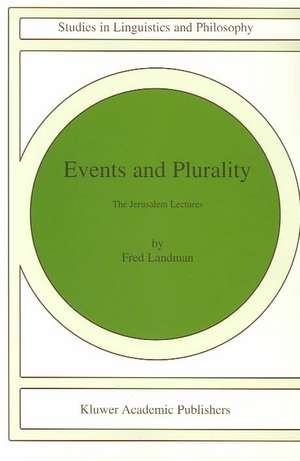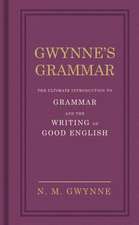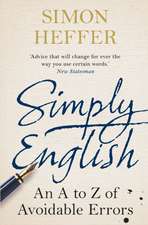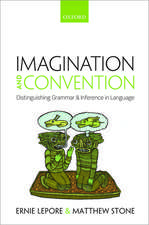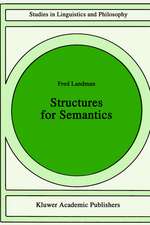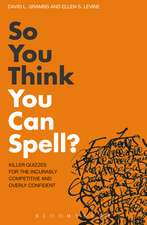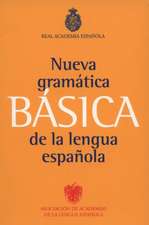Events and Plurality: The Jerusalem Lectures: Studies in Linguistics and Philosophy, cartea 76
Autor Fred Landmanen Limba Engleză Paperback – 30 noi 2001
Din seria Studies in Linguistics and Philosophy
- 15%
 Preț: 583.78 lei
Preț: 583.78 lei - 18%
 Preț: 728.43 lei
Preț: 728.43 lei - 20%
 Preț: 1875.48 lei
Preț: 1875.48 lei -
 Preț: 393.35 lei
Preț: 393.35 lei - 18%
 Preț: 1224.68 lei
Preț: 1224.68 lei - 18%
 Preț: 733.78 lei
Preț: 733.78 lei - 20%
 Preț: 563.40 lei
Preț: 563.40 lei - 20%
 Preț: 509.79 lei
Preț: 509.79 lei - 15%
 Preț: 645.28 lei
Preț: 645.28 lei - 18%
 Preț: 723.69 lei
Preț: 723.69 lei - 18%
 Preț: 1552.05 lei
Preț: 1552.05 lei - 18%
 Preț: 953.65 lei
Preț: 953.65 lei - 15%
 Preț: 647.27 lei
Preț: 647.27 lei - 18%
 Preț: 959.98 lei
Preț: 959.98 lei - 18%
 Preț: 1832.39 lei
Preț: 1832.39 lei - 15%
 Preț: 646.30 lei
Preț: 646.30 lei - 18%
 Preț: 953.03 lei
Preț: 953.03 lei - 18%
 Preț: 1224.06 lei
Preț: 1224.06 lei - 18%
 Preț: 952.09 lei
Preț: 952.09 lei -
 Preț: 394.71 lei
Preț: 394.71 lei - 18%
 Preț: 942.01 lei
Preț: 942.01 lei - 18%
 Preț: 947.50 lei
Preț: 947.50 lei - 18%
 Preț: 955.70 lei
Preț: 955.70 lei - 18%
 Preț: 1223.43 lei
Preț: 1223.43 lei - 15%
 Preț: 653.00 lei
Preț: 653.00 lei - 15%
 Preț: 645.28 lei
Preț: 645.28 lei -
 Preț: 391.99 lei
Preț: 391.99 lei - 18%
 Preț: 942.01 lei
Preț: 942.01 lei
Preț: 396.02 lei
Nou
Puncte Express: 594
Preț estimativ în valută:
75.78€ • 79.32$ • 63.07£
75.78€ • 79.32$ • 63.07£
Carte tipărită la comandă
Livrare economică 01-15 aprilie
Preluare comenzi: 021 569.72.76
Specificații
ISBN-13: 9780792365693
ISBN-10: 0792365690
Pagini: 381
Ilustrații: 396 p. 1 illus.
Dimensiuni: 160 x 240 x 21 mm
Greutate: 0.6 kg
Ediția:Softcover reprint of the original 1st ed. 2000
Editura: SPRINGER NETHERLANDS
Colecția Springer
Seria Studies in Linguistics and Philosophy
Locul publicării:Dordrecht, Netherlands
ISBN-10: 0792365690
Pagini: 381
Ilustrații: 396 p. 1 illus.
Dimensiuni: 160 x 240 x 21 mm
Greutate: 0.6 kg
Ediția:Softcover reprint of the original 1st ed. 2000
Editura: SPRINGER NETHERLANDS
Colecția Springer
Seria Studies in Linguistics and Philosophy
Locul publicării:Dordrecht, Netherlands
Public țintă
ResearchCuprins
Lecture One: Arguments for the Davidsonian Theory.- 1.1. The Davidsonian Theory.- 1.2. The Modifier Argument.- 1.3. Modification of States.- 1.4. Explicit Reference to Events.- 1.5. Explicit Reference to States.- 1.6. Perception Reports.- Lecture Two: The Neo-Davisonian Theory, The Unique Role Requirement and the Language of Events.- 2.1. Finegrainedness and the Unique Role Requirement.- 2.2. The Formal Theory.- Lecture Three: The Neo-Davidsonian Theory and Its Rivals.- 3.1. Passive Sensitive Adverbials.- 3.2. Passives.- 3.3. Multiple Roles.- 3.4. The Argument Extension Alternative.- Lecture Four: Scha’s Theory of Plurality.- 4.1. Plurality Structures.- 4.2. Scha’s language of Plurality.- 4.3. Scha’s Grammar.- 4.4. Plurality in Scha’s Theory.- 4.5. The Interpretations of Numerical Noun Phrases.- 4.6. The Analysis of Cumulative Readings.- Lecture Five: Distributivity, Collectivity and Cumulativity.- 5.1. The Language of Plurality.- 5.2. Link’s Theory of Plurality.- 5.3. Distributivity in Landman 1989A.- 5.4. Thematic and Non-Thematic Roles.- Lecture Six: Plural Roles, Scope and Event Types.- 6.1. The Language of Events and Plurality.- 6.2. Collectivity and Distributivity.- 6.3. Three Theories of Scope and Plurality.- 6.4. Cover Readings.- Lecture Seven: Maximalization on Event Types.- 7.1. ExactlyImplicatures.- 7.2. Scalar Triggers and Maximalization Triggers.- 7.3. The Maximalization Conglomerate.- 7.4. Local Assertions and Core Implicatures.- 7.5. Tracing the Origins of the Ideas.- 7.6. Maximalization in Mixed Cases.- Appendix: Defining Upward and Downward Entailingness for Cardinality Relations.- Lecture Eight: Maximalization on Argument State Types.- 8.1. Maximalization and Scope.- 8.2. Properties and Argument State Types.- 8.3. The Scope Theory.- 8.4.Maximalization on Argument State Types.- 8.5. Readings Predicted by the Scope Theory.- 8.6. Shifting Scopal Relations to Plural Argument State Types.- Lecture Nine: Against Binary Quantifiers.- 9.1. Binary Quantifiers: Some Introductory Methodological Moaning.- 9.2. Binary Quantifiers Versus Binary Determiners..- 9.3. Against Binary Determiners.- 9.4. Branching Quantification.- 9.5. Against Branching Quantifiers.- 9.6. Unary Quantifiers: Some Final Methodological Moaning.- Lecture Ten: Dependent Event Types.- 10.1. Adverbial Distributivy..- 10.2. Dependency Relations.- 10.3. Yellow Pad Problems.- References.
Caracteristici
Includes supplementary material: sn.pub/extras
